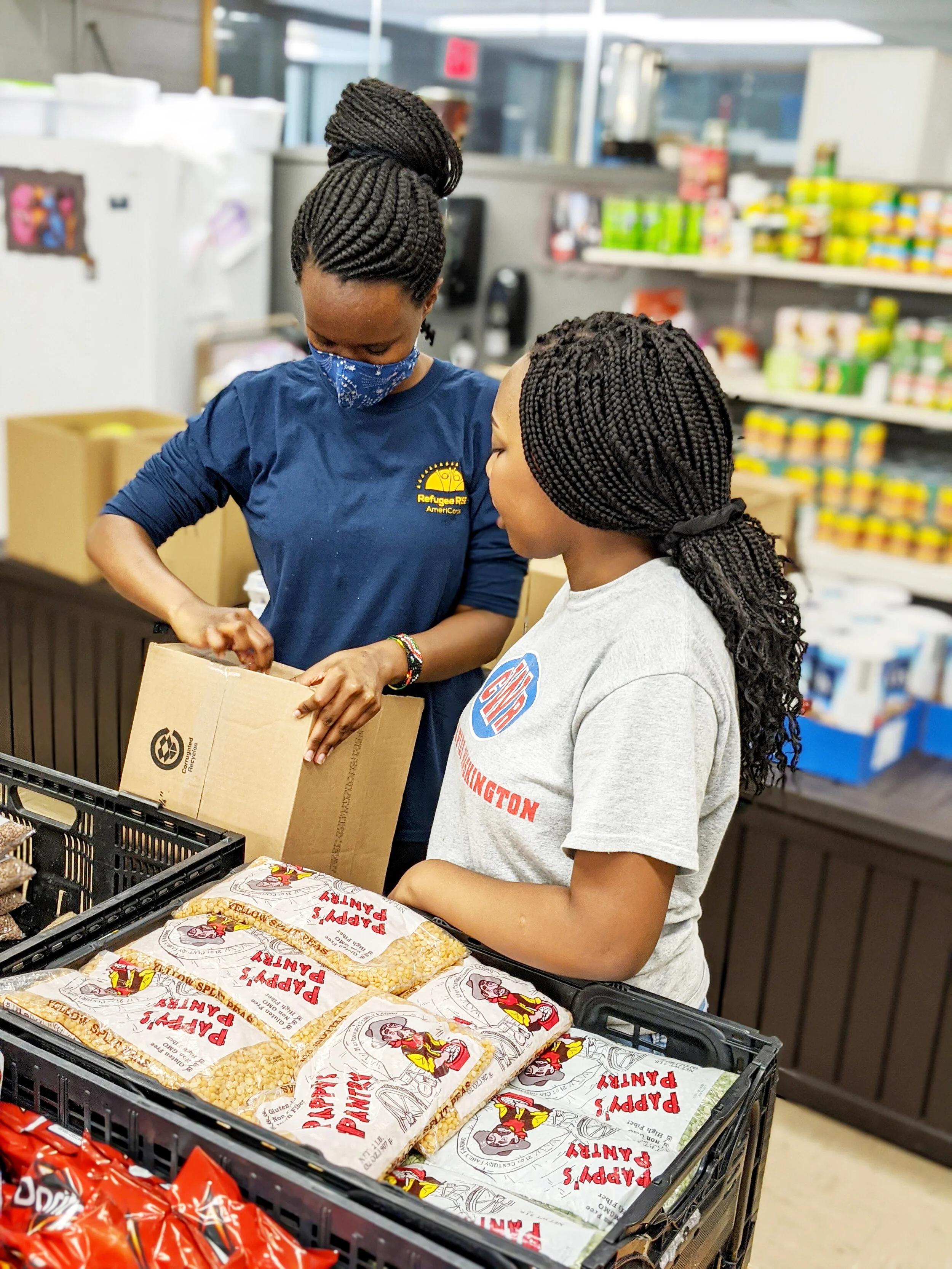Why Hunger Hits Immigrant and Refugees Harder
Behind EMBARC’s origin story is a single family of Karen refugees in Des Moines who had hardly eaten in more than a week. When Henny Ohr, now EMBARC’s executive director, tried to get them food from local resources, she ran into roadblock after roadblock. Eventually, she paid for the groceries herself.
That frustrating experience led Henny to begin advocating for ethnic minorities from Burma who had resettled in Iowa. Within a few years, she and a group of community leaders from the refugee community founded EMBARC. One of their goals was to ensure that refugee and immigrant families in Iowa wouldn’t face hunger like that again. (Read more about EMBARC’s history).
Hunger spikes during the pandemic
Over the past eight years, EMBARC’s work removing barriers to food resources has helped reduce hunger among refugees and immigrants in Iowa. But when the COVID-19 pandemic hit, hunger and food insecurity—defined as a lack of reliable access to enough affordable, nutritious food—became a major problem for families across the state.
Callers to the Crisis Helpline and Virtual Access Center named food as one of their top concerns. Here’s what some of them had to say:
“I need food for my children, but I can’t get it.”
“I am not sure how I can pay my rent and my bills. I am worried about getting my children food, too.”
“I lost my job because of COVID-19. I didn’t know how to apply for unemployment, because I don’t speak English. We didn’t have enough food until the Helpline helped us.”
EMBARC and RISE AmeriCorps members began mobilizing to get food to those who needed it most. We set up lunch deliveries with Des Moines Public Schools and distributed weekly boxes of food—in partnership with Eat Greater Des Moines, Capital City Fruit, and the USDA—at Des Moines Vineyard Church.
In just six months, from April to October:
4,464 people received food
27 community volunteers packed food and made deliveries
150 hours were donated by volunteers
Every week, EMBARC still gives out 90 boxes of food to refugee and immigrant families.
Food insecurity and health
According to the American Journal of Public Health, immigrants to the United States face higher rates of food insecurity. For example, 35% of immigrant mothers experience food insecurity in their households, compared to just 16% of mothers born in the U.S. This lack of nutritious food causes worse health outcomes for children of immigrant parents.
Food insecurity isn’t just bad for children, though. According to Feeding America, in adults, a lack of healthy food can lead to:
Type 2 diabetes
High blood pressure
Heart disease
Obesity
“Among the households served by Feeding America’s national network of food banks and pantries, 58% have at least one member with high blood pressure and 33% have a member with diabetes.”
The causes of food insecurity
For refugees and immigrants in Iowa, multiple complex barriers and challenges coincide to cause hunger and food insecurity
Poverty
Employed in low-wage jobs, many refugees and immigrants can’t afford the high-quality, healthy food sold in grocery stores, such as fresh fruits and vegetables. Some households are even forced to choose between paying for groceries, rent, or medications.
Race also plays a role here. In both Polk County and Black Hawk County, where EMBARC has offices, there is a nearly 18% difference in the poverty rate between white and non-white residents. (Public Tableau)
Food Deserts
The neighborhoods where refugees and immigrants live often lack full-service grocery stores, forcing people to shop at gas stations and convenience stores that don’t stock much healthy food. According to the USDA’s Food Research Atlas, food deserts exist in multiple cities across Iowa, including Des Moines, Marshalltown, Waterloo, Cedar Rapids, and Storm Lake, as well as rural counties like Monroe, Cass, and Harrison.
Language
Immigrants and refugees who don’t speak English often don’t know how or where to access resources like food pantries and community kitchens. Information about these resources may only be available in English. Rarely is it published in less-spoken languages, like Karen, Karenni, and Swahili.
In addition, some food pantries require documentation in order for individuals to receive food. This is a source of stress for many immigrants and refugees, even those who are in the process of becoming citizens.
Finally, some pantries and meal sites ask people to read and sign paperwork, which can be a challenge for non-English speakers and pre-literate individuals.
Eating Habits
Many refugees and immigrants—including those from Asia, Africa, and Latin America—eat different types of food than people born in the U.S. Newcomers who’ve never eaten canned or boxed foods may not know how to prepare them.
This issue has been exacerbated during the pandemic, when safety precautions have led food pantries to pre-pack boxes, rather than allowing families to shop for food themselves. This means many refugee and immigrant families end up with food they don’t like and don’t know how to prepare.
Healthy, traditional fooD
Traditional recipes in Asia, Africa, and Latin America are often healthier and more nutritious than the high-fat, high-sugar items that Americans are used to. Although recipes and cooking styles vary, immigrants and refugees from these regions often use:
Fresh fruit and vegetables
Rice
Dried beans
Cooking oil
EMBARC is working with partners in the food space, including the Des Moines Area Religious Council (DMARC), to get healthy, culturally-appropriate food to immigrants and refugees in Iowa. Strategies include:
Prioritizing fresh produce and rice and beans over canned and boxed foods
Using mobile pantries to reach immigrants and refugees in their neighborhoods
Making direct food deliveries to high-need families
Removing documentation and paperwork requirements
Creating resource videos in multiple languages about DMARC food pantries
Want to try cooking some traditional dishes eaten by refugees and immigrants in Iowa? Check out these recipes from Burma:
Help support EMBARC’s efforts to provide healthy, culturally appropriate food to refugees and immigrants in Iowa.


